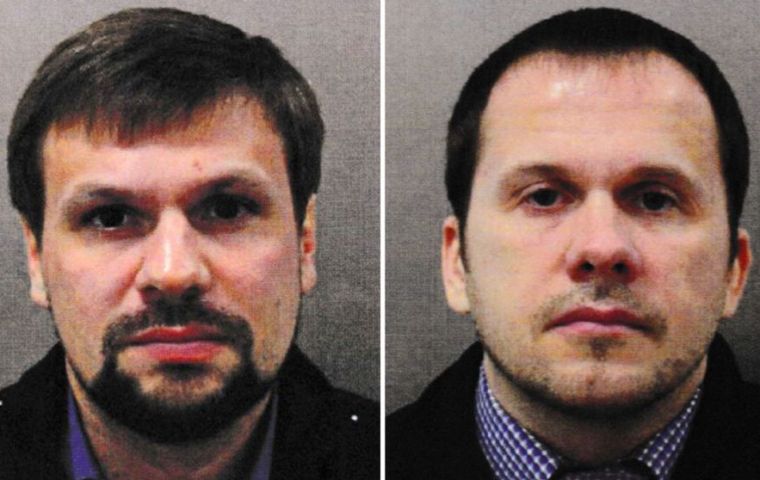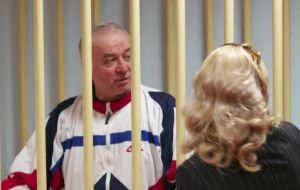MercoPress. South Atlantic News Agency
British prosecutors name two Russian intelligence agents as perpetrators of nerve agent attack in UK
 Prosecutors named the men as Alexander Petrov and Ruslan Boshirov, and said they are officers in Russia's foreign military intelligence agency, the GRU
Prosecutors named the men as Alexander Petrov and Ruslan Boshirov, and said they are officers in Russia's foreign military intelligence agency, the GRU  They have been charged with attempted murder of Sergei Skripal and his daughter Yulia, who were found unconscious on a park bench in Salisbury in March
They have been charged with attempted murder of Sergei Skripal and his daughter Yulia, who were found unconscious on a park bench in Salisbury in March British prosecutors named two Russian men, believed to be officers in Russia's intelligence service, they believe were behind the nerve agent attack on a former Russian spy and his daughter in the U.K. earlier this year. They named the men as Alexander Petrov and Ruslan Boshirov, and said they are officers in Russia's foreign military intelligence agency, the GRU.
They have been charged with the attempted murder of Sergei Skripal and his daughter Yulia, who were found unconscious on a park bench in the small English city of Salisbury in March.
Following the announcement, Prime Minister Theresa May reiterated the U.K.'s allegation that the Russian state had orchestrated the attack on the former Russian spy, who had become a double-agent for the U.K.'s intelligence services in the 1990s and early 2000s — a factor seen as motivation for the attack.
Speaking to parliament Wednesday, May said the U.K.'s security and intelligence agencies had determined that the men were officers belonging to the GRU.
“Based on a body of evidence, the government has concluded that the two individuals named ... are officers from the Russian military intelligence service, also known as the GRU. The GRU is a highly disciplined organization with an established chain of command so this was not a rogue operation,” she said. “It was almost certainly approved outside the GRU at a senior level of the Russian state.”
A European warrant has been issued for their arrest, soon to be followed by an international warrant. The U.K. said it will not seek the suspects' extradition as Russia does not extradite its own citizens.
Russia's foreign ministry responded to the announcement saying the names published “do not mean anything to us,” state news agency RIA said, according to Reuters. It reiterated its position that the investigation of cases such as the Skripal poisoning require “close cooperation and careful analysis.”
Russia has repeatedly denied any involvement in the attack and has, in turn, accused the U.K. of fabricating it. The Kremlin also criticized the U.K.'s decision to not allow it to take part in its investigation.
May told lawmakers on Wednesday that Russia had been repeatedly asked to account for what happened in Salisbury in March but it had replied with “obfuscation and lies.”
“As we made clear in March, only Russia had the technical means, operational experience and motive to carry out the attack,” she said.
Neil Basu, the U.K.'s counter terrorism chief, said the suspects were likely to have traveled under aliases — meaning the names U.K. prosecutors announced on Wednesday are unlikely to be the real names of the suspects — but that both men are around 40 years old and had used genuine Russian passports.
Basu said traces of the nerve agent used by the suspects to poison the Skripals were found in a London hotel room they stayed in before heading to Salisbury. In July, British police had said they'd identified several Russians who they believed were behind the attack but this is the first time they have named them.
Novichok, a type of deadly nerve agent developed in Russia in the 1970s and 1980s, was used to poison the pair who became critically ill but later recovered.
A police officer who attended the Skripals also became critically ill but also later recovered. In July, however, two members of the public, Charlie Rowley and Dawn Sturgess, were poisoned after they inadvertently came into contact with the nerve agent, believed to have been discarded after the March attack. Both became critically ill and Sturgess later died.




Top Comments
Disclaimer & comment rules-

-

Read all commentsPublicly naming them and showing photos has probably ensured their speedy demise...
Sep 07th, 2018 - 05:00 pm +1Russia will not want these people ever to be questioned...
No, they'll just be used for domestic assassinations. Since there is a constitutional bar from handing Russian nationals to the jurisdiction of foreign courts.
Sep 08th, 2018 - 01:59 am 0Commenting for this story is now closed.
If you have a Facebook account, become a fan and comment on our Facebook Page!